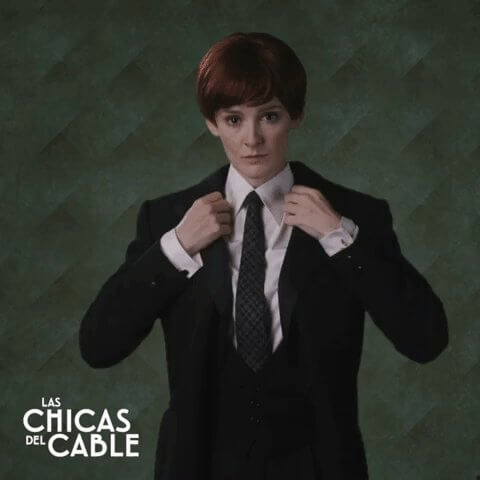Warning: The following contains major spoilers for the first three seasons of Cable Girls!
Cable Girls, the soapy Netflix period drama from Spain about late 1920s phone operators, is back for Season 3. And it has a major queer storyline at its center!
Prior to Cable Girls, few Spain-based films or TV shows have tackled LGBTQ+ storylines. So, it’s no surprise the Netflix series has been so well received. Francoist-era films featuring lesbian or gay storylines are virtually non-existent, let alone ones with trans characters. Aside from the 1973 nominee for Best Foreign Film, Mi querida señorita, about a woman who discovers she is a man, the subject was relatively untouched until the early ’80s.
So, without further ado, let’s get into the nitty gritty of this seriously queer series:
Season one: Lesbian romance and polyamory
Phone operator Carlota (Ana Fernandez) and operating manager Sara (Ana Polvorosa) become romantically involved early in Season 1. The lovebirds bonded when Carlota first gets interested in the women’s rights movement slowly rising in Spain. While attending an underground feminist rally for the women’s vote, she runs into Sara, whose impassioned speech leaves an impression.
There’s an instant attraction, and soon, the two become involved despite Carlota’s relationship with Miguel (Borja Luna). Miguel is also is also employed at the phone company. Eventually, Miguel finds out about the affair. Rather than pursuing the tired love-triangle trope, writers opted to instead allow the characters to explore polyamory together.
Though no one else is knows about their “unusual” relationship, the trio settle into it seamlessly. The trio find time together after work at Sara’s apartment. Until Miguel begins to feel left out. As the women grow closer, he turns to drugs to help him deal. After a near overdose, he decides he no longer wants to be with Carlota and Sara.
Season 2: Saucy and serious shenanigans
Miguel is gradually phased out of the equation in the second season. Then, a major character reveal shifts focus onto Sara and Carlota’s relationship as well as Sara and her gender identity. Later, Carlota and her friends walk in on a violent fight between their friend, Angeles, and her husband, Mario. In their attempt to intervene, Mario is killed, and they dispose of the body by throwing it over a bridge. To avoid suspicion and to make sure Mario is seen boarding a departing train, Sara volunteers to wear his clothes to the station.
Sara, who usually sports feminine clothing, and until now has not demonstrated desire to do otherwise, appears to be triggered by the ruse. Following the event, she becomes distant.
Suspicious of Sara’s peculiar behavior, Carlota begins to tail her. She discovers that Sara is sneaking away to meet with a man named Oscar Ruiz in a hotel. Carlota suspects infidelity until overhearing that “Oscar” is, in fact, Sara in a man’s suit.
Trans trauma

Sara explains that when she was a child, her father beat her to stop her from dressing in boys’ clothes. But, despite that, she reveals that she has always felt like a “man trapped in a woman’s body.” And while she had since then gotten her “urges” under control, the feeling that she wasn’t being her full authentic self never went away. Although Carlota is understanding, Sara still decides she needs to check herself into a mental institution.
Treatment facilities geared towards “curing” the LGBTQ+ community were not uncommon at the time. While Spain is considered one of the most LGBTQ+ friendly countries in the world, from the beginning of Francisco Franco’s dictatorship in 1928, until its end 36 years later, homosexuality and anything falling under that umbrella was deemed illegal, with the occasional interruptions when the law was shortly overturned before inevitably being reinstated.
Sara’s alternative to voluntary treatment would potentially be one of the prisons reserved for those arrested for homosexuality. Ironically, they were referred to as “galleries of deviants” back then. But even voluntary treatment would prove to be torturous. After being subjected to brutal treatments meant to cure her, Sara places a desperate call to Carlota, who then breaks her out of the institution.
Season 2 ends with Sara informing Carlota of a trans community in Berlin that she wants to visit. However, Carlota convinces her to stay in town and start a women’s movement with her instead, rekindling Sara’s activist streak.
Season three: Activism and a church fire
While Sara is yet to identify herself as trans, it’s refreshing to see her story unfold the way it did through the first and second seasons, and it continues to do so in the third.
Season 3 opens at the wedding of the couple’s friend, and protagonist, Alba. Carlota’s father, who is in attendance, and who had stopped speaking to her several months back, makes an unexpected gesture and apologizes for his past disapproval of Carlota’s independent spirit and lifestyle. They hug and make up, but the moment is short-lived. A fire suddenly erupts in the church, killing Carlota’s father.
Carlota soon learns that she will be receiving a large sum of her father’s life insurance money, allowing her and Sara to live comfortably together. It also gives her an opportunity to use some of the funds to support feminist causes she is passionate about, like supporting women’s independence and the right to vote.
Their domestic bliss is short-lived, as a feminist group they’re working with begins to express radical and violent views that the women do not approve of. Upon their failure to convince a judge to convict a man of his own wife’s murder, the group opts to take justice into their own hands by becoming a sort of policing agency that inflicts violence upon oppressors.
‘Cable Girls’ melodrama
Carlota, who during this time has been anonymously expressing her progressive views on a radio station. She’s then outed by the group’s leader when she refuses to participate in their violent demonstrations. As a result, she is attacked at the station by a group of men who want to silence her feminist ideas. She is nearly raped, when Sara and their friends intervene, threatening to call the police.
Angered by the attack, Sara agrees to give the rights group enough money to fund a revenge plan against Carlota’s attackers. What they don’t tell her is that they are also using the money for their own agenda — one that involves guns and explosives, which they use to hold up the phone company during an event hosting the King of Spain, planning to force him to surrender the crown as they feel this will open up a path for the Suffrage Movement to advance.
It all goes horribly, and Carlota and Sara wind up handcuffed together in a room with one of the bombs. Of course, the bombs are expected to go off any minute. Fueled by the intensity of the situation, they recite vows to each other, but they’re rescued just in time. Once outside, Sara asks Carlota if she would ever really marry her.
Carlota replies, “If only it were allowed.”
“Well, you might not be allowed to marry Sara,” she says, “but you can marry Oscar.”
Season four?
The finale leaves the couple on this hopeful note. The series was renewed for a fourth (and later a fifth) season by Netflix only a week after its premiere, and it’s expected to be released as early as Summer of 2019.
All seasons (1-5) of Cable Girls is now streaming on Netflix.
Related:
Netflix Probably Knows Your Sexuality Even Before You Do
Six months before House even thought about questioning her presumed heterosexuality, Netflix started showing her queer content.
‘Riverdale’ Producer Says This Queer Sex Scene Was ‘Too Hot For TV’
‘Riverdale’ has had no shortage of absolutely bonkers plotlines. But the one thing the show won’t air? A sex scene between its two male leads.
Theda Hammel on Her Queer Sundance Masterpiece My Trip to Spain
the characters I write are trans as they would be if I were writing for myself or many of my friends who happen to be trans; trans people who are a little bit bored with their transness and are capable of thinking about something else.
Get a taste of 1930s queer history with The Cable Girls on Netflix. And while you’re at it, stay updated on all things LGBTQ+ by subscribing to the IntoMore newsletter – your time machine to past and present pride!
Help make sure LGBTQ+ stories are being told...
We can't rely on mainstream media to tell our stories. That's why we don't lock our articles behind a paywall. Will you support our mission with a contribution today?
Cancel anytime · Proudly LGBTQ+ owned and operated
Read More in Culture
The Latest on INTO
Subscribe to get a twice-weekly dose of queer news, updates, and insights from the INTO team.
in Your Inbox

















